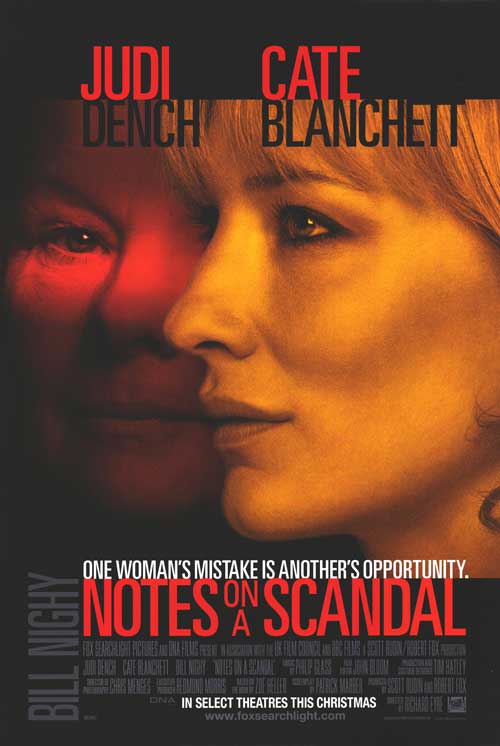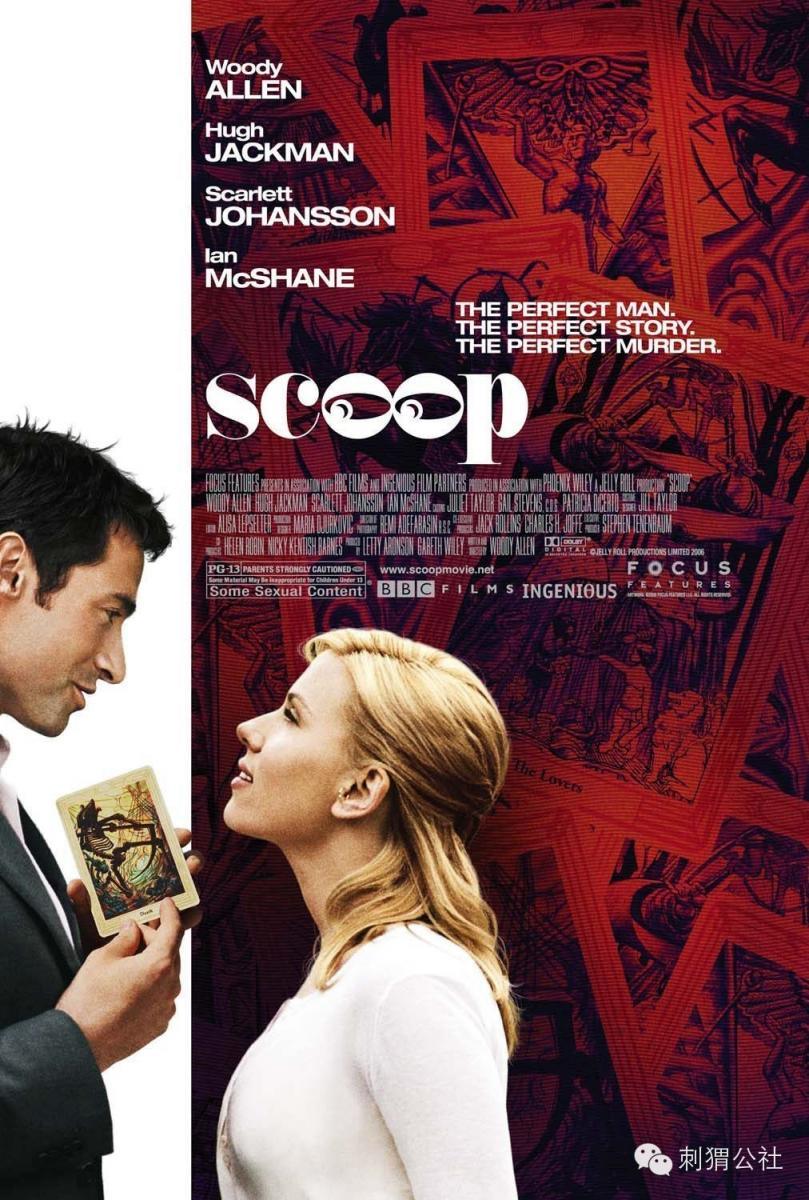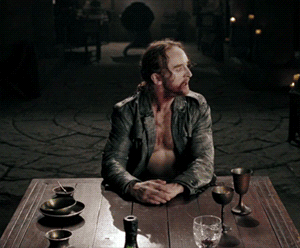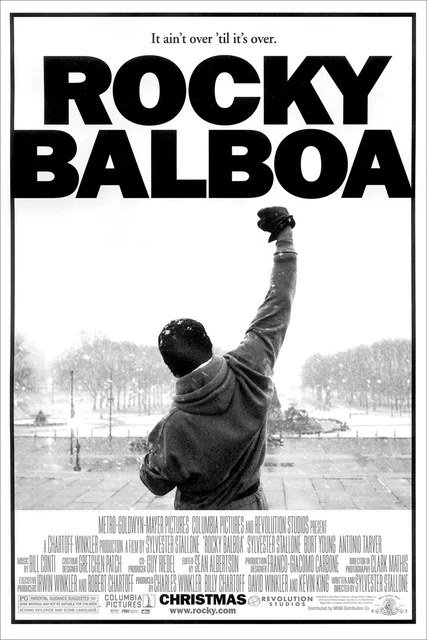
14. Notes on a Scandal

12. Scoop

11. The Departed

Did you know that The Departed is a remake? Yeah, Martin Scorcese took a break from La Cosa Nostra to remix the Hong Kong movie Infernal Affairs into an examination of Boston's Winter Hill Gang. Honestly, I didn't respect Leonardo DiCaprio's skills until this movie. Romeo + Juliet? The Beach? This Boy's Life? Gilbert Grape? Titanic? You can keep all of that. But The Departed got my attention. And Scorcese threw in little details of Boston history like the 1970s busing riots that stemmed from the desegregation of the public school system.
10. A Good Year

A ruthless trader rediscovers the man he used to be -- and a long-lost friend -- when he visits the French vineyard left to him by his favorite uncle.
9. Inside Man

An NYPD detective with a checkered past discovers that there's more to a brazen Wall Street bank robbery than meets the eye.
8. Hostel

7. The Prestige

5. Miami Vice

The film adaptation of popular 80s television show "Miami Vice" turns the substance up a notch and dials the style of the series way down for a much grittier take on the dealings of the Miami-Dade Police Department's vice squad.
After detectives Ricardo "Rico" Tubbs and James "Sonny" Crockett learn that the wife of one of their former confidential informants, Alonzo Stevens, has been murdered, the duo go deep undercover in order to investigate the Colombian cartel responsible.
4. Underworld: Evolution


While every Underworld movie features the one-two punch of both vampires and werewolves, only this one showcases the most impressive lycan and nosferatu of the series. They also happen to be the progenitors and most powerful members of their respective races. Said lycan, William, is also the most awe-inspiring werewolf ever put onscreen.
3. Rocky Balboa

While the man himself does not pursue a comeback in Rocky Balboa, the film most certainly accomplishes that task for the franchise and it's star, Sylvester Stallone. The previous installment, Rocky V, is the series' absolute lowest point, in terms of both profit and artistic integrity. Ironically enough, it was the most expensive to produce. Go figure. I would advise anyone who hasn't seen it to spend the 104 minutes that it would take to watch the movie in its entirety doing something more worthwhile -- such as washing the car in the rain. Because it was so bad, many people decided to skip Balboa upon its initial release, which is a tragedy because its incredible.
Balboa is a return to form in several respects. Stallone, who'd ceded the director's chair for the preceding movie, resumes his duties behind the lens. Rocky reconnects with "Little" Marie, the loudmouth girl he walked home in the first movie. His opponent is portrayed as a thoughtful person and not just a one-dimensional villain. And most importantly, the series reverts to its dramatic roots (the three previous movies are much more action-oriented).
Rocky's relationship with his only son, Robert, Jr., which grew strained in the preceding movie, has only gotten worse over time. Though the elder Balboa's fortunes have risen (he is now a successful restaurateur), he continues to live in the city. Robert, now a grown man, has remained in Philadelphia as well but only maintains minimal contact with his father. Robert, Sr. only sees him when he shows up unexpectedly. Rocky does manage to bond with "Little" Marie's half-Jamaican teenaged son, "Steps" (short for Stephenson). Rocky, who's never been a candidate for Mensa, thinks Jamaica is in Europe.
The crux of the story revolves around Rocky's decision to suspend his retirement and put the gloves back on for a few charity bouts. After the state boxing commission reluctantly reinstates Balboa's license, the current champion's (Mason "The Line" Dixon -- that moronic name is the film's biggest flaw), promoters decide that their client's reputation needs the boost of credibility that would likely result from an exhibition match against the legend. The idea for the bout is actually inspired by a computer-simulated fight between the two produced by ESPN. The software calculates that Balboa would win by a knockout had he been given the opportunity to square off against the undefeated Dixon in each man's prime. Rocky wisely recruits Apollo's old trainer, Tony "Duke" Evers, who determines that because of his physical limitations due to his age (including reduced speed), the former champ must alter his technique and rely on brute strength to have any hope of competing.
Yes, Rocky's old. So is Sylvester Stallone. But in this film it works. Rocky's age is addressed by everyone. And I do mean everyone: the Pennsylvania boxing commission; his trainer, Duke; his son, Robert; his friend and brother-in-law, Paulie; his opponent, Dixon; neighborhood bullies; and Rocky himself.
As per the usual for these films, the simulated bout between Dixon and Balboa is based on real events. On January 20, 1970, 1500 theaters throughout the U.S., Canada and Europe screened a filmed enactment of a fictional boxing match between Muhammad Ali and Rocky Marciano called The Super Fight. At the time the two were the only undefeated heavyweight champions in boxing history and they agreed to act out a fight between them based on the predictions of an algorithm intended to calculate which would win had the two ever met in the ring in peak condition.
Although it debuted 30 years after 1976's Rocky, Rocky Balboa is the first realistic film of the set and was intended to cap the series off for good. Fittingly, the film is partly about closure. While Rocky might've lost a step or two, Stallone's skill in front of and behind the camera has only gotten better. He should really give some thought to continuing his filmmaking career, though he should probably hand the starring roles to someone else if he decides to make more action movies.
2. Mission: Impossible III
At the outset, the producers of the Mission: Impossible film series, a group which includes Tom Cruise, mandated that each entry be helmed by a different director. As a consequence of that decision, each movie has a distinct look and feel. The few constants include: Ethan Hunt; Luther Stickell; the immortal M:I theme song; and of course, an elaborate heist. The wisdom of that initial multi-auteur policy proved to be tactical genius as first time feature film director J.J. Abrams one-ups John Woo and redeems Hunt and co. from the template-for-shitty-straight-cable-action-movies that is M:I 2. Let's be real, if that movie were released for the first time nowadays, it would star Ian Ziering of Sharknado fame -- at best. Not Tom never-less-than-A-list Cruise. Not since Allen Iverson crossed-up Michael Jordan has a rookie humbled a legendary veteran so badly.
The change in director brought changes in direction as well. The first alteration is immediately apparent. A good way to ensure moviegoers don't fall asleep or walk out of the theater due to boredom is to begin the story with a very intense moment a la Goodfellas and Menace II Society. In this instance, the very first time that we see Hunt he's handcuffed to a chair, teary-eyed and desperately attempting to negotiate with a terrorist who's threatening to shoot a bound and gagged woman in the head unless Ethan tells him what he wants to know. What we don't see is Hunt escape. There's a gunshot and then the theme song begins. It almost makes you wonder if you're really watching an M:I film.
M:I-3's release marks the series' 10th year in existence and that passage of time is reflected in the personal growth and maturity of Ethan Hunt. No longer the cocky, reckless, adrenaline-junkie who once thrived on potentially-fatal challenges, Hunt made good on his promise to Luther at the end of the first M:I to leave the action behind and is now a retired field operative who trains others to undertake unreasonable missions. Having had his fill of she-daredevils, he's also settled down and living in suburban bliss with a likable nurse who thinks he works for the Department of Transportation. This new state of affairs is remarkable for an action franchise. Han Solo, for instance, was still running around the galaxy engaged in various schemes into his 70s. Hunt only agrees to go back into the field in order to rescue a former trainee. What hasn't changed for Hunt, unfortunately for him, is the adversarial dynamic he has with his boss -- even though a new man has filled the position. Maybe the missions are so impossible because the agents don't have any support from management. This time around, the department is headed by Theodore Brassel, portrayed by Laurence Fishburne, who remains the most convincing and formidable IMF director to date. As much as you may hate your manager, at least he can't have you bound and muzzled.
There are no more absurd motorcycle duels, no unnecessary slow-motion and no grinning like an idiot during a deadly crisis. Two Jason Bourne films were released since M:I 2 mercifully left the theaters. The folks at M:I were undoubtedly as shamed by the comparison as the shot-callers for James Bond and similarly took inspiration.
This retooled M:I preceded a rebooted and unquestionably improved James Bond film by six months and the third Jason Bourne film by 15. Here's to competition. And the best Mission ever.
1. Casino Royale

Over the years, the producers of the James Bond film series have taken cues from other popular films that they've viewed as competition, most notably, Star Wars (Moonraker) and Shaft (Live and Let Die). The rebooted Casino Royale was heavily, and thankfully, influenced by the Jason Bourne film series. Bourne's artistic and box-office success inspired the filmmakers to eschew nearly all of 007's signature, yet completely superfluous, trappings. Gone are the trick watches, flying cars, evil cat-lovers, air of invincibility, "Q" and Miss Moneypenny. At one point Bond even attempts, unsuccessfully, to revive the love of his life underwater -- just as Bourne did two years earlier, in The Bourne Supremacy.
Flying in the face of the popular adage, blonde Bond seems to be having considerably less fun. He was probably too busy being betrayed, heartbroken, poisoned and bashed in the nuts to enjoy himself. Actually, Bond's torture at the hands of Le Chiffre is the physical representation of M's and Vesper's almost non-stop attempts to emasculate him throughout the movie.
This one film instantly rendered every James Bond movie from 1971 to 2002 both obsolete and unwatchable.
When it was announced that naturally-blonde Daniel Craig had been cast as the new 007 and would not be dyeing his hair to a darker Bond-esque shade the resulting uproar foreshadowed the late Heath Ledger's Joker takeover. Just think, prior to taking the reins from the outgoing Timothy Dalton, Pierce Brosnan was universally considered to be the quintessential James Bond.



No comments:
Post a Comment